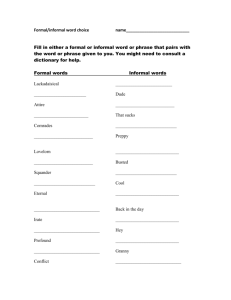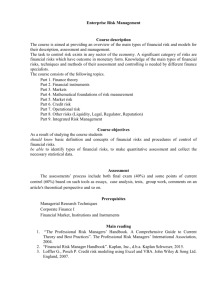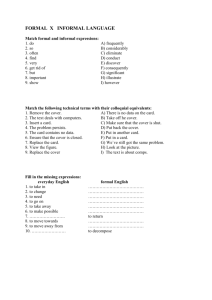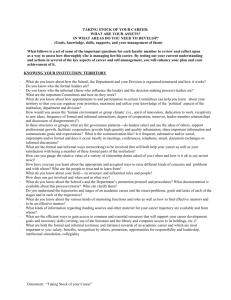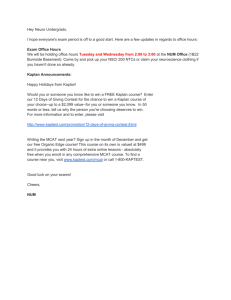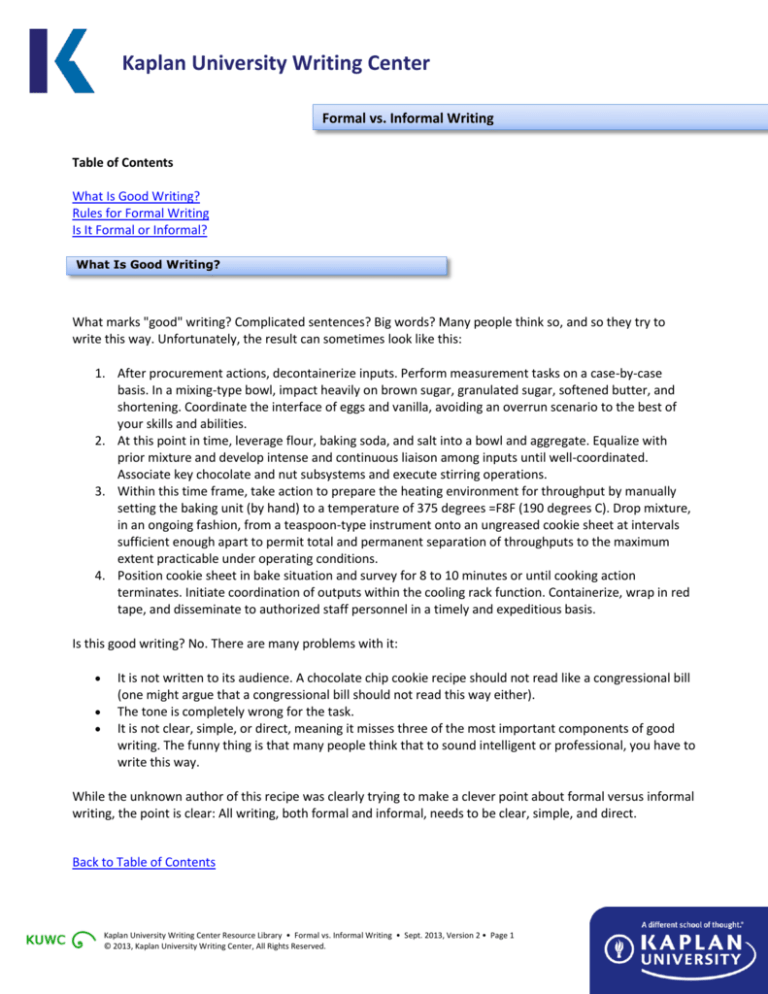
Kaplan University Writing Center
Formal vs. Informal Writing
Table of Contents
What Is Good Writing?
Rules for Formal Writing
Is It Formal or Informal?
What Is Good Writing?
What marks "good" writing? Complicated sentences? Big words? Many people think so, and so they try to
write this way. Unfortunately, the result can sometimes look like this:
1. After procurement actions, decontainerize inputs. Perform measurement tasks on a case-by-case
basis. In a mixing-type bowl, impact heavily on brown sugar, granulated sugar, softened butter, and
shortening. Coordinate the interface of eggs and vanilla, avoiding an overrun scenario to the best of
your skills and abilities.
2. At this point in time, leverage flour, baking soda, and salt into a bowl and aggregate. Equalize with
prior mixture and develop intense and continuous liaison among inputs until well-coordinated.
Associate key chocolate and nut subsystems and execute stirring operations.
3. Within this time frame, take action to prepare the heating environment for throughput by manually
setting the baking unit (by hand) to a temperature of 375 degrees =F8F (190 degrees C). Drop mixture,
in an ongoing fashion, from a teaspoon-type instrument onto an ungreased cookie sheet at intervals
sufficient enough apart to permit total and permanent separation of throughputs to the maximum
extent practicable under operating conditions.
4. Position cookie sheet in bake situation and survey for 8 to 10 minutes or until cooking action
terminates. Initiate coordination of outputs within the cooling rack function. Containerize, wrap in red
tape, and disseminate to authorized staff personnel in a timely and expeditious basis.
Is this good writing? No. There are many problems with it:
It is not written to its audience. A chocolate chip cookie recipe should not read like a congressional bill
(one might argue that a congressional bill should not read this way either).
The tone is completely wrong for the task.
It is not clear, simple, or direct, meaning it misses three of the most important components of good
writing. The funny thing is that many people think that to sound intelligent or professional, you have to
write this way.
While the unknown author of this recipe was clearly trying to make a clever point about formal versus informal
writing, the point is clear: All writing, both formal and informal, needs to be clear, simple, and direct.
Back to Table of Contents
Kaplan University Writing Center Resource Library • Formal vs. Informal Writing • Sept. 2013, Version 2 • Page 1
© 2013, Kaplan University Writing Center, All Rights Reserved.
Kaplan University Writing Center
Rules for Formal Writing
The difference between formal and informal writing is not that the former is confusing and uses big words (as
the cookie recipe above did), but that formal writing follows a list of conventions or rules that generally include
the following:
Avoid contractions: Do not contract words like "don't" (instead of “do not”) or “they’re” (instead of “they are”). Write them out in their full forms ("will not” for “won’t”). Avoid slang and swear words: Do not swear, cuss, or use words so new that only your friends know
what they mean. Write "the men in the study ate faster than the women" not "the dudes really
snarfed on their grub; the babes had no chance."
In general, avoid first (I, me, my, mine, we, us, our) and second (you, your) pronouns. This rule has a
firm logical grounding:
o
First person pronouns (I, me, my, mine) should be used only to relate personal experiences
and opinions. For example, if you are writing a paper about minimum wage and whether or
not it is enough for people to live on, and you earn minimum wage, you have some relevant
personal experience to contribute. In many research papers, however, there is not a place for
personal experience, and so in these types of papers, the first person should not be used.
o
In addition, first person pops up a lot in phrases like “I think,” “I believe,” and “in my opinion.” Ninety-nine percent of the time, these phrases can just be deleted. They are repetitive and
redundant because you are the author, so obviously your paper is based on your own opinion.
You do not have to state the obvious.
o
“We” does not work very well in formal writing either. Some authors like it because it can form a bond between the writer and the audience, saying "we are in this together" to readers.
Unfortunately, this technique can easily backfire. People do not like to be told what they feel
or think. Using "we" assumes that everyone has the same view, which can alienate an
audience, even one that agrees with the author.
o
“You” should also not be used in formal writing. Imagine you are reading a paper about step
parenting. You are not a stepparent yourself, but the topic is interesting. Every paragraph or
so, the author writes a sentence like, "You want to discipline your stepchild, but you are not
sure if that is your role.” Because the paper is written to a more general audience who are not all stepparents, this type of writing can be strange. Every time you, as the reader, read "you,” you have to pause and think, "Not me.” If the paper was written for stepparents and no one else, this form of address might be acceptable, but it is still something that should be avoided.
Reserve "you" for when it really can encompass everyone (and that is a rare occasion).
Back to Table of Contents
Kaplan University Writing Center Resource Library • Formal vs. Informal Writing • Sept. 2013, Version 2 • Page 2
© 2013, Kaplan University Writing Center, All Rights Reserved.
Kaplan University Writing Center
Is It Formal or Informal?
What determines whether your writing is informal or formal includes the following:
1. What type of writing it is (letter, report, email, memo, brief)
2. Who the audience is (friend, boss, family member, review board, judge)
An email to a friend may be informal, while an email to a prospective employer is likely to be very formal, as
formal as a normal business letter.
Back to Table of Contents
Kaplan University Writing Center Resource Library • Formal vs. Informal Writing • Sept. 2013, Version 2 • Page 3
© 2013, Kaplan University Writing Center, All Rights Reserved.



